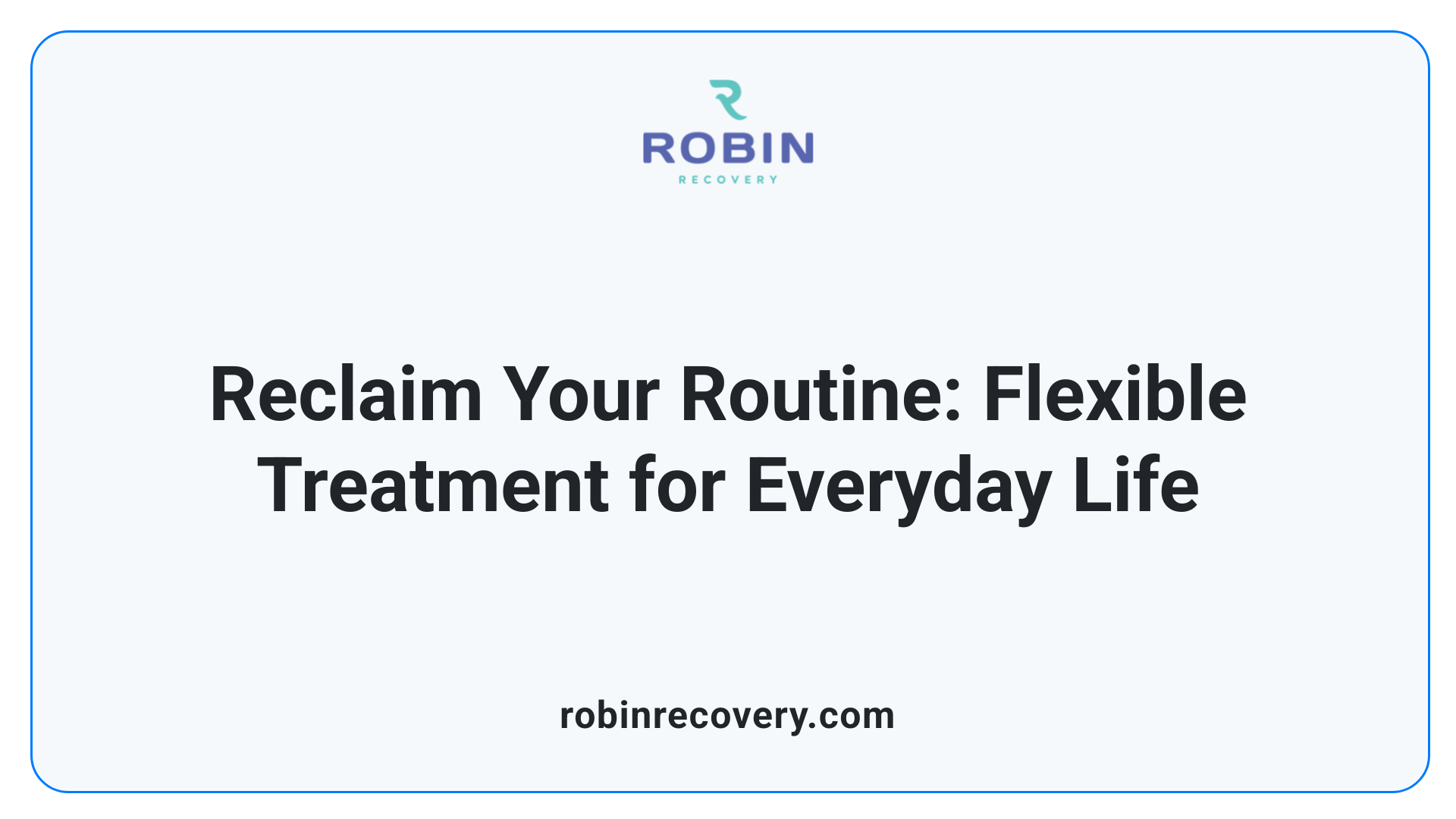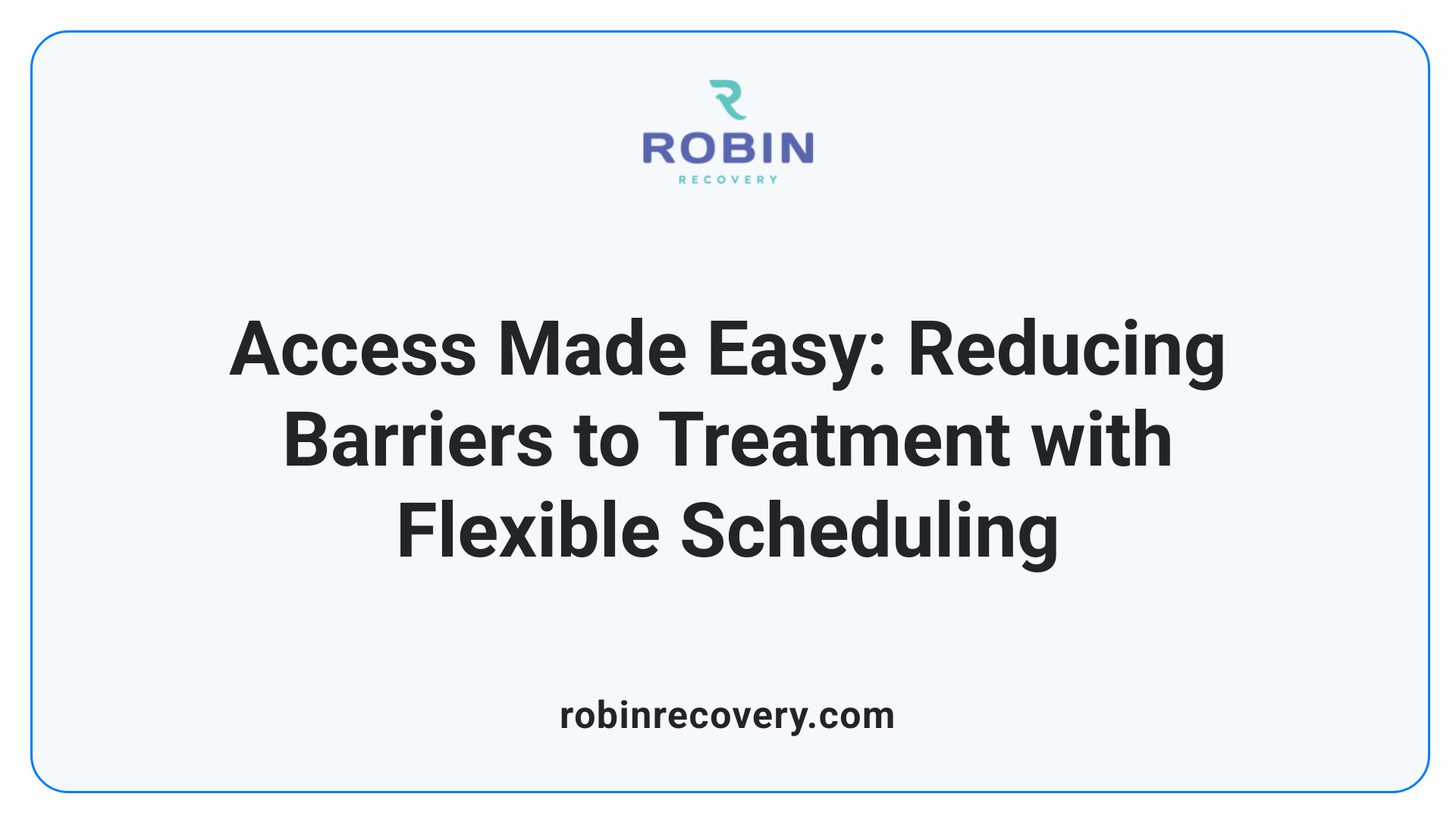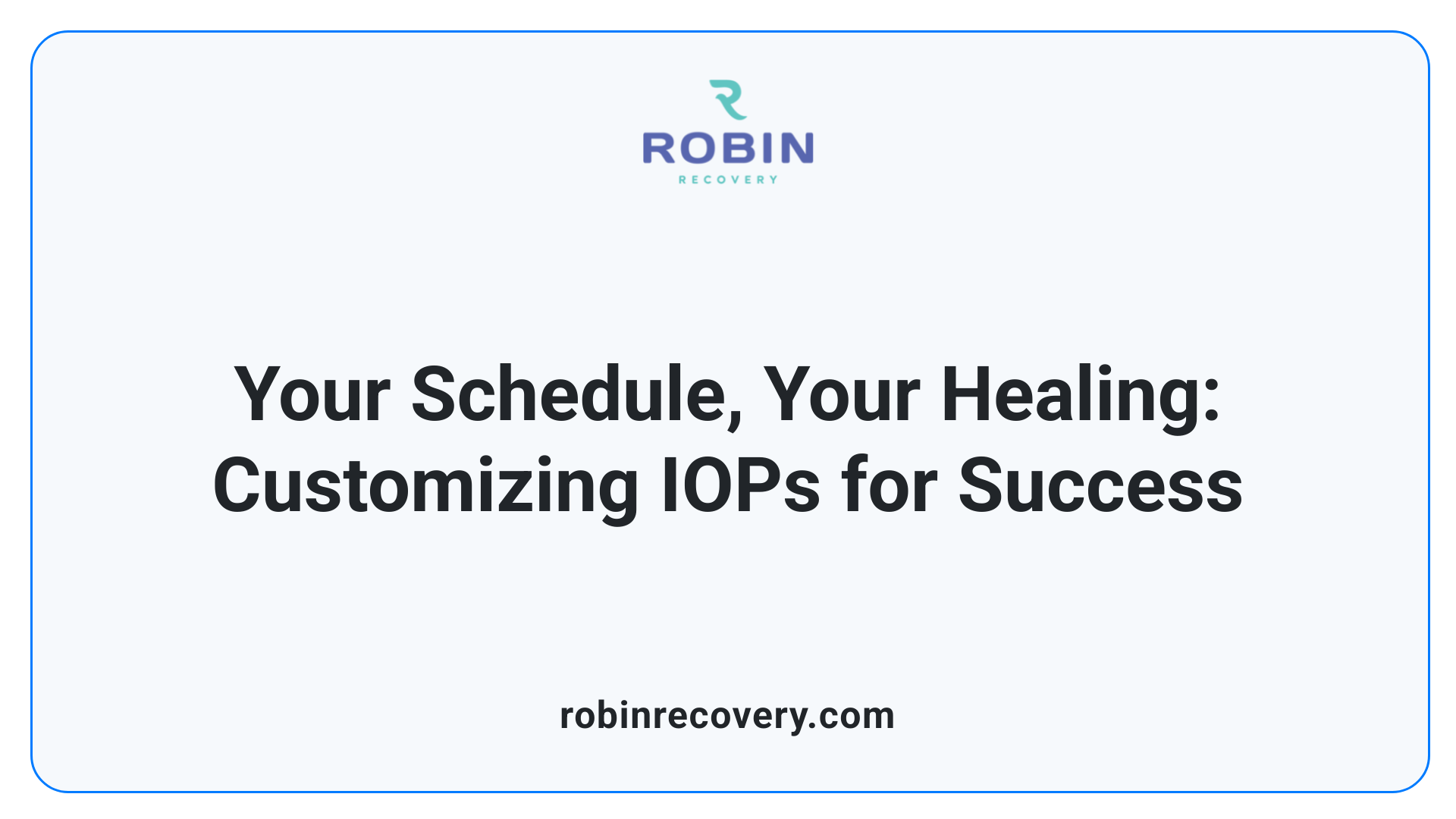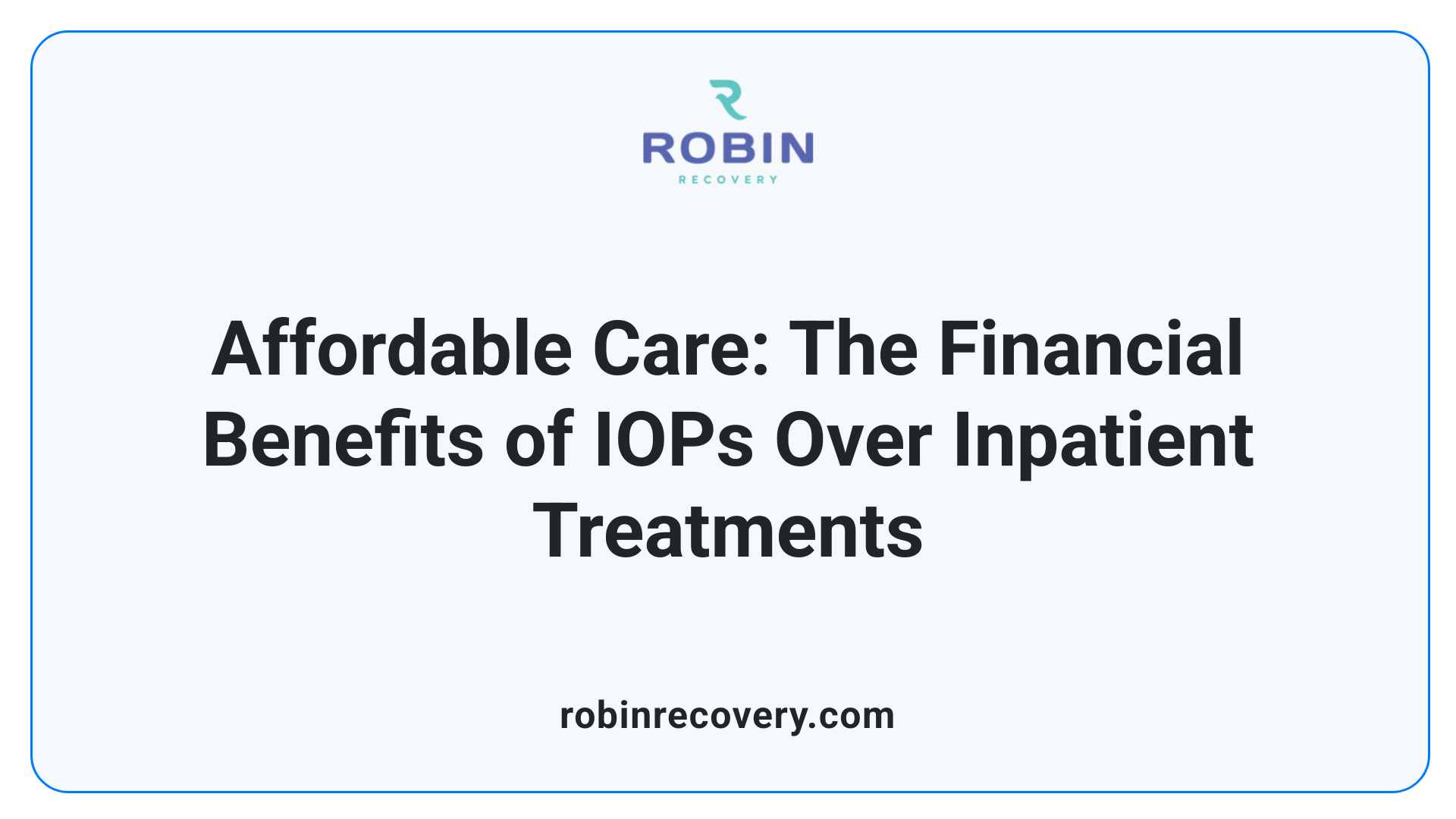The Benefits of Flexible Scheduling in Intensive Outpatient Programs

Understanding Flexibility in Intensive Outpatient Programs
Intensive Outpatient Programs (IOPs) have emerged as a popular and effective option for individuals seeking addiction or mental health treatment. Unlike traditional inpatient care, IOPs are designed to integrate treatment with daily life, offering significant flexibility. This article explores the numerous benefits of flexible scheduling in IOPs, highlighting how this approach supports participants in maintaining personal responsibilities while receiving comprehensive care.
Balancing Treatment with Daily Obligations

How flexible scheduling allows participants to continue their daily activities
Flexible scheduling in Intensive Outpatient Programs (IOPs) is designed to accommodate the busy lives of participants. This setup allows individuals to attend therapy sessions while maintaining their daily responsibilities, such as work, school, and family commitments. By offering sessions at various times throughout the day, including mornings and evenings, patients can find a routine that fits seamlessly into their lifestyles.
Having the option to schedule sessions around personal obligations significantly enhances accessibility and lowers barriers to treatment. Patients can select the most convenient slots, whether it’s early in the morning or right after work.
Benefits for work, school, and family commitments
IOPs provide substantial benefits for individuals navigating the dual demands of treatment and daily life. The flexibility of these programs helps alleviate financial stress, a common trigger for relapse. Participants can continue earning an income or attending school while receiving essential support.
The inclusion of varied therapeutic formats, including group therapy and individual counseling, fosters an environment that promotes personal growth and accountability. Group sessions allow patients to engage with peers, creating a supportive network that enhances motivation and reduces feelings of isolation.
This supportive framework is particularly effective for those transitioning from inpatient care, as it helps them integrate their new coping skills into everyday situations immediately. Ultimately, the flexibility offered by IOPs not only aids in recovery but also empowers individuals to lead balanced lives during treatment.
IOPs vs. Traditional Inpatient Treatments
How do Intensive Outpatient Programs (IOPs) differ from traditional inpatient treatments in terms of balancing personal responsibilities?
Intensive Outpatient Programs (IOPs) stand out for their flexible approach, allowing individuals to manage personal responsibilities such as work, school, or caretaking while receiving vital treatment. This aspect is particularly beneficial for those who may struggle with the demands of a full-time inpatient program, which typically requires a complete commitment involving living on-site and being away from daily responsibilities.
With IOPs, patients engage in therapy sessions that usually span 2 to 5 hours, 3 to 5 days per week. This structured yet adaptable schedule means participants can continue to attend to life’s obligations while integrating their recovery efforts.
By preserving day-to-day routines, participants learn to apply therapeutic skills directly to real-world scenarios, which reinforces learning and fosters independence.
How does maintaining independence impact recovery during treatment?
The ability to live at home during treatment with IOPs directly contributes to a sense of normalcy and stability. Participants enjoy the autonomy to manage their lives, which can significantly reduce the anxiety associated with treatment.
Moreover, having the freedom to customize therapy schedules enhances personal commitment to recovery. Patients often find that this freedom reduces feelings of burnout and helps in developing strong time management skills as they successfully balance treatment with personal obligations. The community support fostered through group therapies not only aids in recovery but also supports maintaining a connection to their daily lives, which is crucial for long-term success.
AspectFlexible IOPsTraditional Inpatient CareLiving Arrangement Patients reside at home Full-time facility-based living Flexibility of Schedule Customized sessions, morning and evening options Rigid schedule with little flexibility Independence Maintains daily routines, fosters autonomy Limits independence, focuses on full immersion Support Structure Group therapy, peer support Mostly individual therapy Application of Skills Immediate real-world application of skills Learning occurs in a controlled environment
In summary, IOPs provide a flexible, effective option for individuals aiming to balance their recovery with their everyday lives, supporting ongoing independence while ensuring access to structured support.
Supporting Personal Accountability and Independence

Enhancing personal responsibility through flexible scheduling
Flexible Intensive Outpatient Programs (IOPs) prioritize personal accountability by allowing participants to tailor their treatment schedules. With sessions available in the morning or evening, patients can choose times that align with their work or school commitments. This flexibility fosters responsibility, encouraging individuals to manage their attendance alongside daily activities.
Regular assessments allow patients to adjust their session frequency as needed, accommodating changing responsibilities. By taking ownership of their schedule, participants not only engage more effectively but also apply therapeutic skills learned in real-time, reinforcing their commitment to recovery.
Impact of living at home on recovery success
Living at home during IOPs significantly enhances recovery outcomes. It offers a sense of stability and normalcy, helping individuals maintain connections with family and friends. This environment fosters independence, giving patients the chance to assimilate their treatment into everyday life without the disruptions associated with inpatient settings.
Being in a familiar space allows for immediate practice of coping strategies learned during therapy sessions. Additionally, the presence of family can provide emotional support, further bolstering an individual’s efforts to remain sober and engaged in their recovery journey.
Altogether, the combination of flexible scheduling and the ability to live at home equips individuals with the tools they need for sustained recovery success.
Improving Accessibility and Engagement

How flexible scheduling reduces barriers to treatment
Flexible intensive outpatient programs (IOPs) are designed with the recognition that life's demands often interfere with treatment adherence. By offering sessions in the morning, afternoon, or evening, these programs ensure that individuals can attend therapy without sacrificing their work, education, or family commitments. This adaptability significantly reduces the stress associated with coordinating treatment around busy schedules.
Moreover, virtual IOP options play a crucial role in removing geographical and transportation barriers, providing easy access for individuals even in remote areas. Participants can receive the care they need from the comfort of their homes, further decreasing the likelihood of missed sessions, which is essential for successful recovery.
Engagement and compliance improvements with convenience-based scheduling
Flexible scheduling not only improves attendance rates but also enhances patient engagement in therapy. When individuals can choose session times that fit their lifestyle, they are more likely to maintain a strong commitment to treatment. This approach fosters a sense of autonomy and control, helping patients feel empowered in their recovery journey.
Furthermore, by allowing participants to adjust the frequency and timing of their sessions, IOPs support ongoing engagement tailored to each individual's evolving needs. This level of personalization results in higher compliance and, ultimately, better treatment outcomes as participants apply their learning in real-world scenarios.
Tailored Schedules to Enhance Treatment

Customization of Therapy Schedules Based on Individual Needs
Flexible intensive outpatient programs (IOPs) prioritize personalized care through tailored scheduling. Participants have the freedom to customize their therapy sessions based on daily responsibilities, whether it's work, school, or family commitments. This adaptability ensures that patients can attend therapy consistently without compromising their other obligations. At Trinity Behavioral Health, for example, patients can create their session timetables, choosing from multiple available slots throughout the day, including early morning, midday, or evening options. This level of customization encourages regular participation, enhances engagement, and ultimately leads to better treatment outcomes.
Benefits of Session Flexibility to Patient Engagement
The ability to adjust therapy timings is not just about convenience; it significantly affects patient motivation and commitment to the recovery process. Flexible scheduling minimizes stress and ensures that individuals can integrate therapy into their lives more naturally. For those managing many responsibilities, having the option to adjust the frequency of sessions can lead to a more manageable treatment experience. Furthermore, this flexibility promotes immediate application of learned skills in real-world situations, reinforcing progress and building coping mechanisms in real-time. Overall, tailored schedules in IOPs greatly enhance patient engagement, driving successful outcomes in recovery.
Cost-Effective and Comprehensive Care

What are the cost advantages of IOPs over inpatient programs?
Intensive Outpatient Programs (IOPs) provide a significant cost advantage compared to traditional inpatient treatment. One of the most compelling reasons for their affordability is the absence of room and board expenses. Patients can receive the necessary therapy without the financial burden associated with residential programs. This makes IOPs particularly appealing to those who need comprehensive supports but may not be able to afford extended inpatient stays.
Additionally, outpatient care typically includes flexible intake procedures and may offer varying pricing based on services utilized, allowing for more tailored financial planning. Many providers also accept insurance, further reducing the out-of-pocket costs for patients.
What comprehensive services are offered in IOPs, including group and individual therapies?
IOPs are structured to provide a well-rounded approach to mental health and substance use treatment. They incorporate multiple therapeutic modalities, including individual counseling sessions and group therapy.
Group therapy not only fosters peer support but also enables participants to share experiences and coping strategies. This can be particularly valuable, as it builds a network of support essential for recovery. Individual sessions allow for personalized attention, addressing specific challenges and progress relevant to each participant.
In addition to therapy, many IOPs offer psychoeducation and skill-building workshops, further enhancing the recovery process. These diverse services cater to the unique needs of individuals, ensuring a comprehensive treatment experience that supports sustained recovery without the costs associated with inpatient facilities.
Conclusion
Flexible scheduling in Intensive Outpatient Programs offers a transformative approach to addiction and mental health treatment. By allowing participants to maintain their daily responsibilities while receiving comprehensive therapy, IOPs foster a more effective and engaging recovery journey. The adaptable nature of IOPs not only enhances treatment accessibility but also promotes personal accountability and independence, making them an invaluable option for those seeking to regain control of their lives while addressing their mental health challenges.
References
- Benefits of Flexible IOPs - CAST Treatment Centers Hollywood
- How flexible are the virtual IOP programs schedules?
- How Do Intensive Outpatient Programs (IOPs) Work?
- 5 Benefits of an Intensive Outpatient Program (IOP) | PrairieCare
- Exploring the Flexibility of Intensive Outpatient Programs
- Outpatient Program: A Flexible Approach to Mental Health Recovery
- Intensive Outpatient Programs vs Partial Hospitalization
- A Guide to Typical IOP Schedules - VIVE TREATEMENT CENTERS
